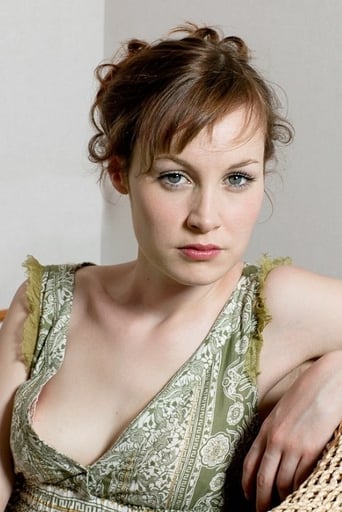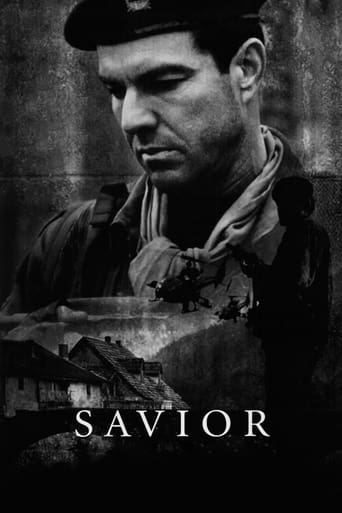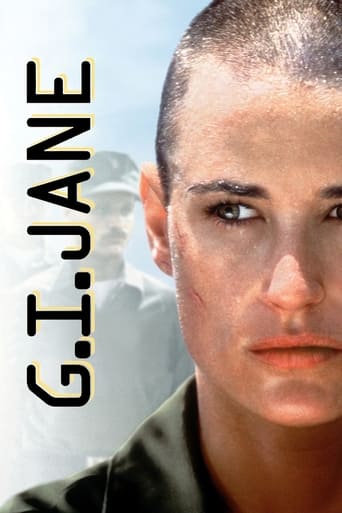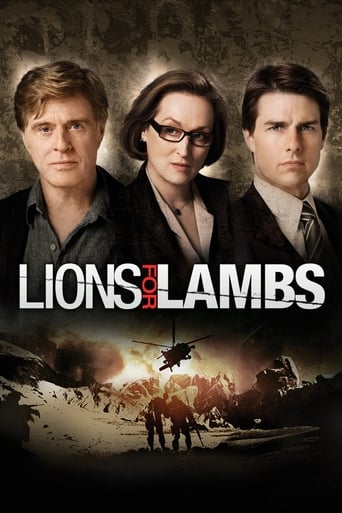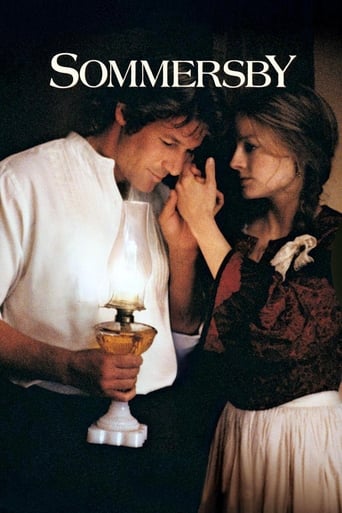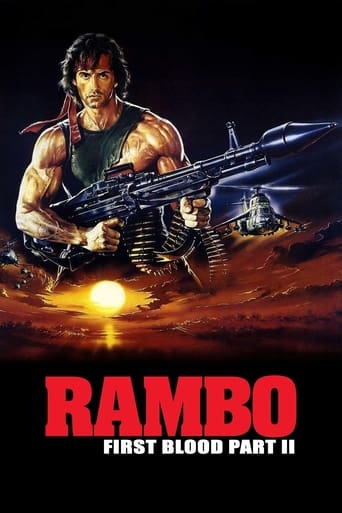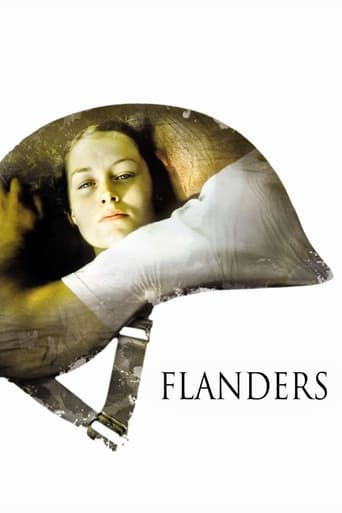
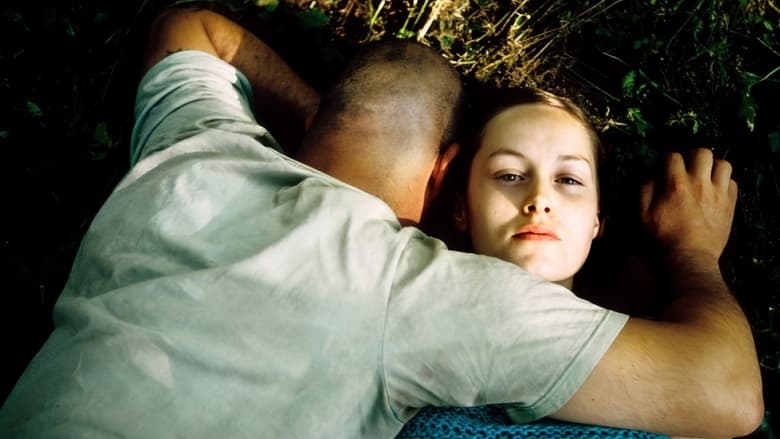
Flanders (2006)
André Demester secretly and painfully loves Barbe, his childhood friend, accepting from her the little that she gives him. He leaves home to be a soldier in a war in a far off land. Barbarity, camaraderie and fear turn him into a warrior. As the seasons go by, Barbe, alone and wasting away, waits for the soldiers to return. Will Demester’s boundless love for Barbe save him?
Watch Trailer
Cast


Similar titles
Reviews
Great Film overall
An Exercise In Nonsense
As somebody who had not heard any of this before, it became a curious phenomenon to sit and watch a film and slowly have the realities begin to click into place.
It's funny, it's tense, it features two great performances from two actors and the director expertly creates a web of odd tension where you actually don't know what is happening for the majority of the run time.
It's clear from other reviews that more or less everybody is agreed about the director's rather tricksy film-making and the lack of conventional narrative drive. It's just a question of whether you think these things make for a good film or a bad film.For me, the good outweighs the bad: the deliberately non-emotional characterization, slow pace, and powerful use of landscape push viewers out of their comfort zone, and force us to confront some pretty basic realities about life and war.It's the parallels - not the contrasts - between home life and the war that are most interesting. On many occasions, the film seems to have a deliberately timeless, ahistorical feel, so that the characters feel tremendously elemental (the word medieval springs to mind too) in their behaviours and concerns. Despite a slight lack of coherence (not necessarily in the plot, more in the overall conception), we do genuinely somehow care for the characters - quite an achievement given the overall tone of the movie.The use of Flanders as the setting and title reinforces this sense of historical continuity, of war recurring down through the ages - not for nothing is the region known as "the cockpit of Europe". And by the way, a big chunk of historical Flanders is now in France (the French-plated cars, with "59" indicating the North department which includes most of French Flanders, are a giveaway). French Flanders is by definition not in Belgium, as one reviewer has suggested. However, one of the female characters (Barbe's friend) appears to have a strong Flemish (i.e. Dutch-speaking) accent - a nice touch, and not entirely implausible in this border region, where a few people still speak Flemish on the French side of the border (visit Hondschoote, and you'll see what I mean).This film should make everybody rethink their approach to war, and the impact of sending young men (and women, although not in this film) from more or less every generation off to fight and die (remember that Flanders was scarred by war twice in a lifetime in the 20th century). Not necessarily a particularly easy watch on the face of it, but a powerful and worthwhile one.
What is surprising in this film is the way the director uses a very simple minimalistic style of telling a story to cope with one of the most important themes of the contemporary world - the involvement of the young people in Western countries in wars that happen in the third world. This is the story of two young men from some rural place in Northern France or French speaking Belgium who are sexually involved with the same girl before being sent to fight a war in a remote Islamic country. The girl has her own mental problems and has an abortion while the young men face all possible horrors of war, face death, commit and are subjected to unimaginable violence. All is told in very simple, well filmed and clear images, and this creates a strong emotional impact. With simple cinematographic tools the director sends a message of distress and pain about the conflicts human beings are subjected to in the world today. Worth watching.
Bruno Dumont seems to have an obsession for depicting his fellow French citizens in some pretty dark & dismal situations. Thankfully, this makes for some edgy,concise drama. Although I walked away major disappointed with the last film of his I saw (The Twenty Nine Palms), this made up for it in spades. The plot concerns the tentative relation ship between a farm hand (Samuel Boidin),and the local town slut (Adelaide Leroux),who's screwing everybody in the local phone book. Andre has been called to the Army to fight in a war in a non specific area (Iraq?). Andre soon finds out about the hell that is war,while Barbe deals with her own demons. If you've ever seen any of Dumont's other films will know that he doesn't make things easy for his audiences (sex that is depicted in his films is generally unerotic,if not downright ugly to watch,plus violence is never approached with restraint). If you've managed to make it this far, 'Flandres',although unpleasant to watch,is none the less,a film well worth checking out.
In a way, Bruno Dumont's Flandres is no more realistic than Cuarón's Children of Men. It doesn't exactly seek to depict real people or a real war. Dumont's people are laconic, but the powerful film-making tells a clear and moving story. Using simple, economical means and focusing on a few individuals, presenting scenes that follow a logical, universal progression, Flandres is able to tell a profound story about war's ravages at home and on the front. Dumont's storytelling is simple and sure. So is the cinematography of Yves Cape and the editing of Guy Lacorne. And so is the acting, especially of Samuel Boidin as Démester and of Adélaïde Leroux as his girlfriend Barbe -- but also of Henri Cretel as Démester's friend Blondel, and of Jean-Marie Bruveart (Briche), David Poulain (Leclercq), Patirce Venant (Mordac), David Legay ( (Lieutenant) and Inge Decaesteker (France).The film focuses on a young farmer and his girlfriend. He and some other locals are going off to war. Last sex, last drinks with friends, last campfire gatherings, last work in the field with a tractor.Then, the departure: roll call, near a truck, a few people waving goodbye. Next Démester is in the desert. In an attempt to take a building (a scene we know well through documentary news footage from Iraq) one of their officers is blown up. A helicopter takes away the body. They enter the building and kill a couple of youthful partisans -- fighters, clearly, but also mere pitiful boys.Each of the scenes is iconic and vivid. This is low-budget war, but it feels real enough. How big is the budget of a few men fighting out in the bush? There are tanks and explosions aplenty. Most of all there is sweat and dust and blood. Two other things happen. The squad captures a woman fighter, and some of the men rape her. Later, on a hillside, they trap a farmer on a donkey loaded with firewood, and they shoot him. They are subsequently captured by members of the enemy (who are North African--but their dialogue isn't translated; and they could be Iraqis) who know what they have done, and they are severely punished.Meanwhile André's (Démester's) girlfriend Barbe at home grows more and more unstable and after a violent psychotic break, she is hospitalized, but later released.André escapes with his friend Blondel, but when Blondel's shot, he runs off to save himself.Dumont uses the inarticulate country talk of the people to underline the universality of the events. How did Blondel die, his girlfriend wants to know later? "Balle dans la tête," Démester says; a bullet in the head. That's all he wants to say, and all we need to know. Démester is a brute, in a way. But he's also got a sweet smile. He's childlike. He is the child sent off to kill that all war builds upon.Next we see Démester back home. The final sequences convey how damaged he and his girlfriend and his friend's girlfriend are now. André suffers from survivor guilt. Their state is pitiful, but the last shot is positive. André is lying on the dirt with Barbe and telling her over and over "Je t'aime...je t'aime." I love you.This is classic Dumont style, if on a bolder and grander scale than before. His people are none the less noble, pathetic, and human for being reduced to simplicity, even crudity. Dumont has told a story as energetic and forward-driven as the Dardennes brothers' L'Infant, but more universal, and even more concise (91 rather than 100 minutes). As in Dumont's L'Humanité and La Vie de Jésus, there's a grandeur that emerges from the stripped-down, minimal scenes and people. Everything works. It's surprising that Variety's usually canny reviewer made it sound dull and off-putting. There is still resistance to Dumont's style.



